|
It seems appropriate that I was introduced to the cinema of Kurosawa Kiyoshi whilst visiting Japan, when a group of film students with whom I was drinking in a Sinjuku shōchū bar presented me with a DVD of his 1997 Cure as a leaving present. I didn't get to watch it until I was back on home turf, but it blew me away. Later that year I was similarly impressed with his 2001 Pulse, a haunting study of isolation and loneliness dressed in J-horror clothing. For my money he stumbled a little with Bright Future [Akarui mirai] and Doppleganger (both 2003), which although intriguing in their own right, explored their subtext and symbolism so directly that they played a little like deconstructions of their own metaphoric storytelling. The 2005 Loft and the 2006 Retribution [Sakebi] did little to restore his reputation as one of the most original and exciting of the new generation of Japanese filmmakers, but in 2008 he directed the hugely impressive Tōkyō Sonata, and quickly found himself the subject of worldwide critical discussion and retrospective appreciation.
Back in 1996, he began work on what has become known as his revenge diptych, two films that were planned to be written in tandem – the first by Takahashi Hiroshi and the second by Kurosawa – and shot quickly and cheaply in quick succession. The process was not without its hiccups, with Kurosawa completing the screenplay for the second film while Takahashi was still struggling with the first, leaving the director with the second half of a story that had no beginning. Takahashi's script was eventually completed and the two films were released to home turf to critical acclaim as A Visit From Fate (1996) and The Scar That Never Fades (1997, and listed on IMDb as Fukushu the Revenge Kienai Kizuato).
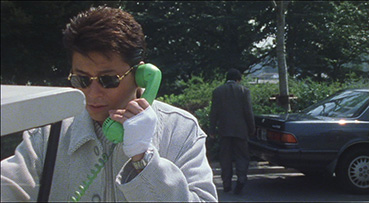
Pleased with the results (in an interview with French on-line magazine EigaGogo,* he claims that these two films are his personal favourites from his own filmography), Kurosawa was apparently keen to repeat the experience, and he and Takahashi began writing a second pair of revenge themed films using the same approach, and with the same result – once again Kurosawa completed his screenplay well ahead of his colleague, who had again been charged with writing the first of the two films. Unlike their predecessors, the films here were not designed as two halves of the same story, but two separate works employing the same situation as a kicking-off point, that of a man seeking revenge for the murder of his young daughter. The first was The Serpent's Path [Hebi no michi], the second Eyes of a Spider [Kumo no hitomi], and despite being made quickly using the same crew and featuring the same leading man, these are two very different films.
If, by some chance, you approach The Serpent's Path knowing nothing of its content (a little tricky when I've given away the opening premise that binds these two films), then it can take a short while to work out exactly what is happening here. Even when you do, there are still a couple of small misdirections waiting in the wings, particularly for those familiar with Japanese yakuza thrillers. If you'd prefer to experience these small twists for yourself then I'd give the fourth paragraph a miss (I'll remind you when you get to it). It is, after all, rather fun to let the film reveal the nature of its central characters in its own time and way.
It opens with the apprehensive Miyashita (Kagawa Teruyuki, who played the father who loses his job in Tokyo Sonata) and the confident, unflappable and shades-wearing Nijima (Aikawa Shō) driving through a Tokyo suburb in search of a specific house. "Sure it's the right guy?" Miyashita asks his companion. "They're all involved anyway," replies Nijima suggestively. They locate the house in question and bluff their way past the security gate to the front door, which the home's occupant is clearly reluctant to open. But the two bust their way in and floor the man with one of those electric stun guns that it's probably a good thing you can't buy in the UK. They bundle him up and drive him to an empty warehouse, where he's chained to the wall and shown a video of Miyashita's young daughter happily playing, while her father reads out a police report detailing the horrible things that were done to her body before she was killed. The terrified prisoner's name is Otsuki, and he has been abducted so that Miyashita can dish out a slow and horrible revenge for this appalling crime. Except Otsuki swears that he didn't do it, but eventually claims to know who did.
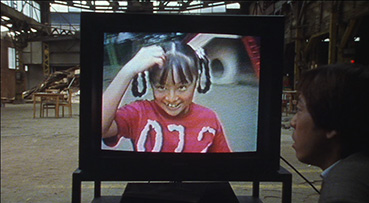
Unlike the majority of revenge themed movies, little is cut and dried here. That Miyashita's daughter was horribly murdered is never in question, but who was actually responsible is not so clear. Nijima seems certain he has the right man, but what if he hasn't? Could the pair end up killing an innocent individual while the real perpetrator goes free? And what if Otsuki has pointed the finger at the actual killer, a high-ranking and heavily protected yakuza named Hayama? How do they grab him and chain him to the wall? And what are the potential consequences for them if they do?
This last question becomes even more pertinent once we learn a bit more about our vengeful abductors (this is the paragraph you might want to skip if you want to experience those small but well timed and handled character reveals). When we first meet the duo it seems clear that ordinary family man Miyashita has somehow enlisted the help of cocksure yakuza Nijima in tracking Otsuki down. Yet once their prisoner is tied up and Miyashita has been dissuaded from blowing his head of, Nijima heads off for his evening job as a night school teacher of theoretical physics (at least I think that's what he and his class are puzzling over on their blackboard of indecipherable hieroglyphics). A yakuza teaching classes? Hardly. Nijima is no gangster, but a man acting out a role he has long dreamed of playing. Miyashita, on the other hand, used to work for Hayama in a position we later learn has direct bearing on his current situation. Miyashita has tried to run away from a past life that Nijima seems oddly keen to embrace, but there's clearly more to it than wannabe gangster posturing. As the story progresses and Nijima repeatedly goes his own way with the plan, it becomes increasingly uncertain what his motivations really are.
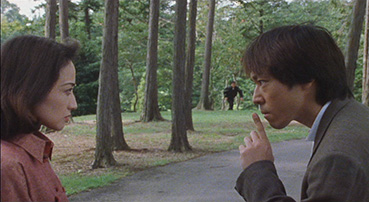
The Serpent's Path is a smartly developed and consistently enthralling crime drama whose exploration of revenge as a logistically messy and morally questionable act is compellingly and sometimes unsettlingly handled. It keeps you on the hop over where it will go next, is propelled forward by a string of convincing performances and the odd and unexpected moment of jet-black comedy, and builds to a climactic confrontation that delivers the expected crime thriller goods. There's even a memorable henchwoman who appears to have been partially modelled on Juana Durango from David Lynch's Wild at Heart, but maybe I'm reading too much into what may just be a happy coincidence. The result is a tightly structured and thoroughly satisfying work, and without question one of my favourite Kurosawa films to date.
While sharing the same starting point as The Serpent's Path, the Kurosawa penned The Eyes of a Spider walks a very different road, something that becomes evident at an early stage. Here it's Nijima (again played by Aikawa Shō) who is the grieving father, and as the film begins he's already completed a six-year quest to track down his daughter's killer and is strapping him to a chair for a long and unpleasant punishment. His wife knows nothing of his new extra-curricula activity ("Overtime again?" she casually asks him when he gets in that evening), and these early scenes suggest that the story is set to alternate between Nijima's torture of his captive and his seemingly normal home and work life, and possibly explore how the former impacts on the latter. But three story days and a mere five minutes of screen time later, the captive has died of his beatings and is being buried by Nijima, an act that appears to be being watched by the cloth-wrapped and upright corpse of his daughter.
The effect on Nijima is to strip him of very thing that has driven him since his daughter's death, leaving his life devoid of meaning and purpose. He drinks morosely alone in bars and suggests to his wife that they go abroad for a month or even a year, something she acknowledges without taking that seriously. Then one day he is approached by his former high school friend Iwamatsu, who invites him to come and work for him. Nijima's not so sure but eventually accepts, presumably in the hope that it will fill the hole in his life left by the sudden termination of his six-year quest for revenge. Initially bemused by the purpose of his mundane new duties and even by what Iwamatsu's company actually does, he soon finds himself drawn into the murky world of organised crime.
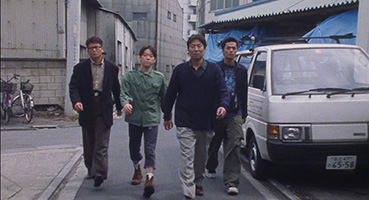
Despite being companion pieces, I'd seriously suggest not watching The Eyes of a Spider immediately after The Serpent's Path, particularly if you found the first film as gripping as I did. This second film is so different in tone and intention that you need to shake off what made its predecessor so satisfying to appreciate this film's more idiosyncratic qualities. While the pursuit of revenge was not just the initial premise but central to the whole story of The Serpent's Path, in The Eyes of a Spider it provides a prologue for Nijima's seemingly unrelated transformation from family man to cold-hearted gangster.
In some key respects the film has less in common with The Serpent's Path than the early yakuza films of Kitano Takeshi, something particularly evident in the unhurried pacing, the oddball character humour, the seashore character scenes and even the manner in which sequences are shot and edited. There's even one of Kitano's signature scene transitions, where an urgent discussion on a course of action to be taken cuts immediately to its violent aftermath, completely bypassing the event itself. The dark and occasionally borderline absurdist humour certainly has a Kitano ring, from the assassination that is delayed while the killers click through empty chambers to find a gun that has any bullets left in it, to the increasingly comical tracking shot in which a yakuza go-between is repeatedly driven alongside a walking Nijima to pester him for a report he has ordered to write on Iwamatsu. The lengthy and amusing wide shot in which the elderly yakuza boss invites Nijima to chase him and the two scurry over a distance that would even younger men wheezing** is all Kurosawa's own.
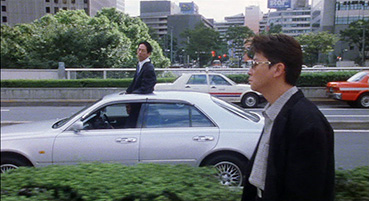
To get the most out of The Eyes of a Spider, it really is worth knowing that it's not a revenge drama in the mode of its predecessor, but an offbeat gangland story in which the opening act of vengeance is little more than a catalyst for a change in Nijima's personality and future life choices. This does take a while to really register, particularly if watched immediately after more narrative driven The Serpent's Path. But as the story progresses, it becomes clear that Nijima's rapid progression in this new criminal role is down in no small part to his seemingly unflappable surface cool, a by-product of his post-revenge emotional vacuum. It all builds to an appropriately dark and violent climax and a finale with semi-supernatural overtones, which are then symbolically contradicted by a jarringly abrupt and initially perplexing ending – give it a second go and you may find yourself reading all sorts into it. A strange but oddly satisfying film, The Eyes of a Spider may initially seem to sit in The Serpent's Path's shadow, but give it a chance and you may well find that, in its own quietly offbeat way, it's every bit its equal.
Both films are framed 1.85:1 and anamorphically enhanced, and while not exactly standard-setters, the picture quality on both is rather better than you might expect for two low-budget films that have hardly seen the light of day outside of Japan. As so often is the case, daylight exteriors tend to come off best, with some of the gloomier interiors having a grubbier feel, although this is not consistent – the first wide shot of Nijima's prisoner taped to his chair in The Eyes of a Spider looks fine, but the contrast and detail on the two shots that follow are noticeably weaker. Some digital enhancement appears to have taken place, visible on the faint halos around heads when framed against lighter backgrounds, and in digital nature of the picture grain. Contrast is often rather good, especially outside, though some picture detail does get swallowed in darker scenes. It's all very watchable, though, and allowances can be made due to the rarity of the films. There is no damage and precious few dusts spots on either transfer.
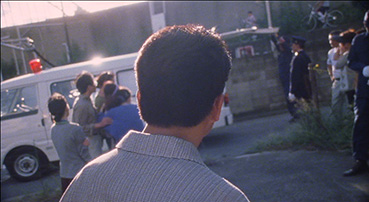
The Dolby Digital 2.0 mono tracks are clean and clear and free of background hiss, important in films that make such effective use of silence. The sparsely used music and louder sound effects are reproduced without distortion.
The optional English subtit les are clear and generally accurate, despite the odd small spelling error. There are a couple of small oddities on The Serpent's Path, however, with a phone number that appears on the subtitles in two places being different to one that is spoken, and the decision to add a few uses of the word "fuck" to dialogue that in Japanese contains no swearing is an irritating trait carried over from the subtitling of Kitano's Sonatine for home video by Quentin Tarantino's Rolling Thunder label.
Not a thing on the disc, but you're getting two feature films here for the price of one, both new to the UK, so it's hard to complain.
A most welcome UK DVD release for two fine but very different companion-piece crime movies from one of Japan's most important yet least championed modern filmmakers. The transfers are serviceable and sometimes better than that, and the lack of extras is not an issue given that you get two feature films in one very reasonably priced package, both of them making what as far as I'm aware is their UK debut here. Warmly recommended, and devotees of modern Japanese crime cinema this should consider this an essential purchase.
* You'll find the interview in question here: http://eigagogo.free.fr/en/interview-kiyoshi-kurosawa.php – this was also my main source for information on the development of the two films.
** This brought back a very particular memory for me. Years ago, when I first visited Japan, I was introduced to and became friendly with an elderly gentleman whose croaky voice and slightly stooped posture told a small story in itself about his likely age and frailty. Yet when he invited me to accompany him on a long walk to what I gather was the highest point in the local parkland area, he shot up the hill at a speed that left me struggling for breath.
The Japanese convention of family name first has been used for Japanese names throughout this review.
|